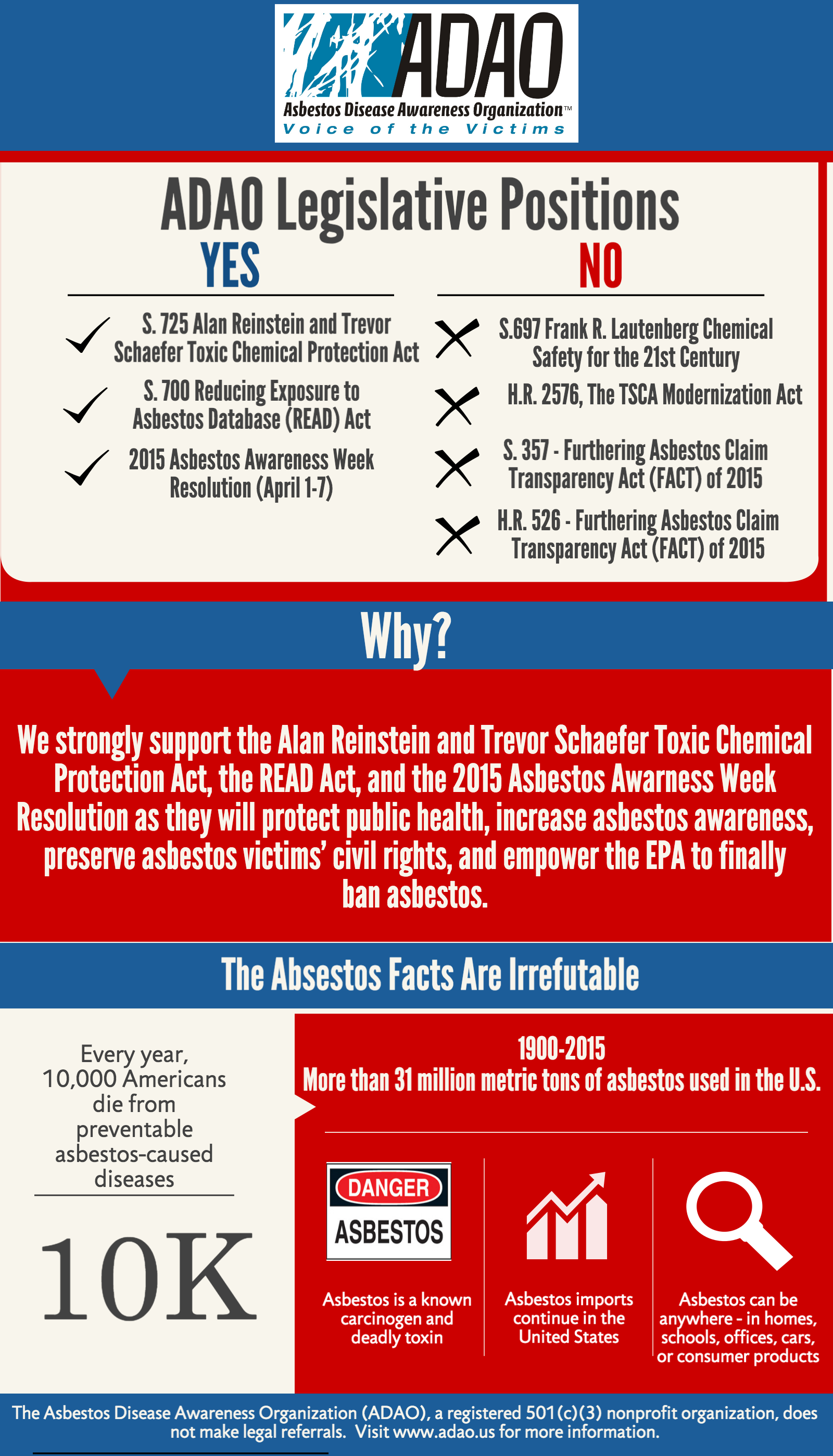Updated on June 3, 2015
Posted on May 12, 2015
 Over the last eight weeks, the Asbestos Disease Awareness Organization (ADAO) has remained a stakeholder passionately advocating on behalf of asbestos victims’ and American citizens’ rights in Congress. While some proposed legislation could significantly harm asbestos victims and push back toxic chemical reform, there are other bills that inspire hope for the future of American public health. Today, we are at a crucial moment. As a leader in prevention, ADAO needs your help and voice in Washington, D.C.
Over the last eight weeks, the Asbestos Disease Awareness Organization (ADAO) has remained a stakeholder passionately advocating on behalf of asbestos victims’ and American citizens’ rights in Congress. While some proposed legislation could significantly harm asbestos victims and push back toxic chemical reform, there are other bills that inspire hope for the future of American public health. Today, we are at a crucial moment. As a leader in prevention, ADAO needs your help and voice in Washington, D.C.
Simply, we say:
NO to the FACT ACT
NO to the Toxic Substances Control Act of 1976 (TSCA) Rollback Bill – S. 697 as written
YES to the Senate and House READ Acts
Here’s why:
Toxic Substances Control Act of 1976 (TSCA)
Existing TSCA and toxic chemical protection from 1976 fails to ensure chemical safety in the U.S. Both Democrats and Republicans agree that the legislation is outdated and needs reform calling for further review and protection from the 84,000 potentially hazardous chemicals in our homes, schools, and workplaces. We are urging Congress to pass legislation that ensures the Environmental Protection Agency (EPA) can expeditiously review and take action to ban asbestos within three or less years.
ADAO Opposes: “The Frank R. Lautenberg Chemical Safety for the 21st Century Act (S.697)
ADAO Supports: The Alan Reinstein and Trevor Schaefer Toxic Chemicals Protection Act (S. 725) and recent related asbestos amendments proposed by Senator Boxer.
ADAO Opposes: House of Representatives TSCA Modernization Act H.R. 2576 and TSCA Modernization Act” Summary.
Rationale: S.697, proposed by Senator Tom Udall (D-NM) and Senator David Vitter (R-LA) and currently the leading proposed TSCA reform legislation in discussion, is inadequate. ADAO cannot support TSCA reform legislation that fails to name asbestos or ensure its expeditious EPA review. Furthermore, this proposed legislation only allows approximately 10 of the 84,000 chemicals in our homes, communities, environment, and commerce to be tested and reviewed by the EPA per year. In contrast, S.725, introduced by Senator Barbara Boxer and Senator Ed Markey (D-MA), along with recent asbestos amendments proposed by Senator Boxer, specifically name asbestos and ensure expeditious EPA review of asbestos.
Reducing Exposure to Asbestos Database (READ) Act
The READ Act reforms and improves the outdated Asbestos Information Act of 1988 by creating a federally controlled database listing products that contain asbestos, therefore allowing for publicly accessible and understandable asbestos prevention information.
ADAO Supports: The Reducing Exposure to Asbestos Database (READ) Act (S.700) and (H.R. 2030).
Rationale: This bill, proposed by Senator Dick Durbin (D-IL) along with Congressional Representatives Suzane DelBene (WA-01) and Gene Green (D-TX29), improves the status quo and recommends an accountable, transparent process that ensures the protection of public health and prevention of asbestos exposure. It would mandate companies using asbestos to submit annual reports on their asbestos-containing products and allow the American public to more easily access and search the Federal Register.
Furthering Asbestos Claim Transparency (FACT) Acts
ADAO Opposes: The Furthering Asbestos Claim Transparency (FACT) Act of 2015 (S. 357) significantly threatens the rights of asbestos victims by requiring the public disclosure of previously confidential settlement terms between asbestos trusts and claimants.
ADAO Opposes: The Furthering Asbestos Claim Transparency (FACT) Act (H.R. 526)
Rationale: The FACT Act, proposed by House Representative Blake Farenthold (R-TX27), was introduced to improve transparency and protect companies from “double recovery” by asbestos victims. Unfortunately, when looking at the facts, it becomes clear that asbestos victim “double recovery” is a falsified problem. Although this act claims to champion transparency, it marginalizes an already under-served population who has suffered at the hands of asbestos. The so-called FACT Act is designed to make it even more difficult for asbestos victims to receive justice in court and hold asbestos corporations responsible for the harm their products have caused. Adding insult to injury, it would also violate asbestos victims’ privacy by releasing sensitive information on a public website. The FACT Act protects the asbestos industry rather than asbestos victims and represents a violation of privacy for those involved in asbestos settlements.
Thank you for your dedication and support!
Together, change is possible.
Linda
